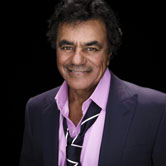My introduction to the music of Johnny Mathis was likely similar to that of millions of Americans who grew up after the sun had set on his generation of swinging crooners, pushed aside by the popular onslaught of rock and roll. It was a record entitled, simply enough, Johnny Mathis: Merry Christmas.
That record wasn’t the most popular holiday album on the family’s annual rotation, but it did have its special place, reserved when the mood needed just the right dash of quintessential mid-century charm, the proverbial nutmeg sprinkled on top of the eggnog.
Speaking on the phone in advance of his two night stint at the Meyerson Symphony Center with the Dallas Symphony Orchestra, Johnny Mathis says he is grateful for that Christmas album. He says it was a tribute to his mother and their family Christmases growing up and that it is indicative of the many collaborations he has enjoyed throughout his long career (Merry Christmas featured musical director Percy Faith). But what the album also shows is how the singer has managed to remain in the popular imagination all these years, despite the fact that his career was, in part, defined by the music he did not sing: rock and roll.
Mathis signed to Columbia Records in 1956, the year Elvis Presley scored his breakout hit “Heartbreak Hotel.” Mathis, who had cut his teeth singing in California jazz clubs, was seen as a safer alternative heartthrob to the hip-tossing boy from Memphis, and despite some dabling, he never really bought into the new style of pop music.
“I put my toe in the water,” Mathis said of rock and roll. “But said, okay, you don’t do it very well.”
Rock and roll is just about the only style of music that Mathis hasn’t done. Known for his syrupy romance tunes, hits like “It’s Not For Me to Say” which toiled on the charts next to Elvis’s “All Shook Up,” Mathis has recorded jazz and Broadway standards, Brazilian and Spanish songs, R&B and soul, and even had a disco album in the late seventies. His latest record is country.
Mathis has never been afraid to crossover, try new things, or work with new collaborators, including a pairing with Jane Olivor for a song which received an Oscar nomination in 1979. The real secret to Mathis’ lasting power, however, is the strength of his trademark velvety voice, which he attributes to lessons he received as a young boy.
Mathis was born in East Texas, but moved to San Francisco when he was four where he was reunited with his piano playing father. Mathis’ dad, the singer recalls, became his musical “buddy.”
“I remember when I was young he came home from work one day with a big bunch of wood,” Mathis said. “It turned out to be a piano. He installed it in our small apartment.”
Mathis’ father played songs he had learned living in Texas himself, such as Bob Wills’ “San Antonio Rose.”
“I stood there and listened night after night,” he said. “I was the only one [in my family] who seemed to take to it.”
Recognizing his son’s talent, Mathis’ father made an arrangement with a local voice teacher, who traded lessons with the youngster for errands and odd jobs. She taught him to sing the hits by the musicians he loved – Nat King Cole, Sarah Vaughn, Ella Fitzgerald – but, having some professional experience in light opera, his teacher trained him to take care of his voice like an opera singer.
“Fortunately, all those lessons paid off because I’ve learned to sing in a way that is not detrimental to my voice,” he said. “And I haven’t lost my enthusiasm for music. But I am always guided by what I can sing at 75 – what sounds good.”
Photo by Jeff Dunas





